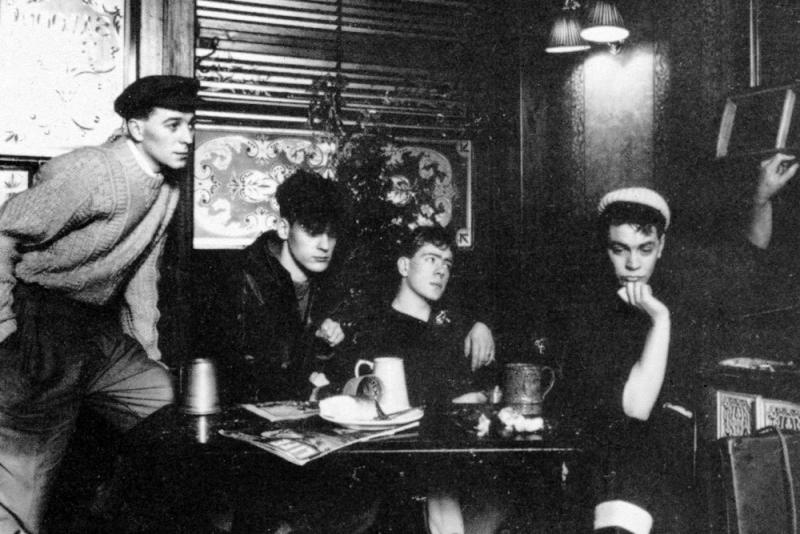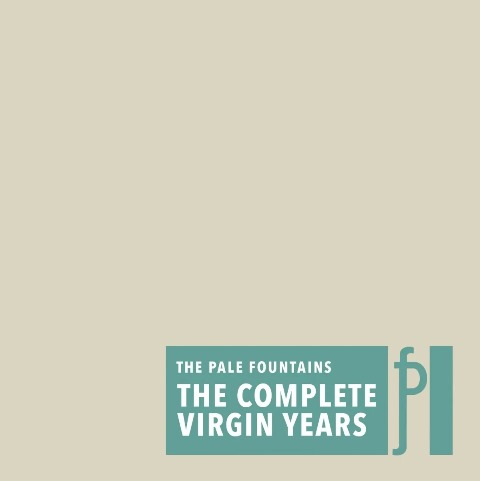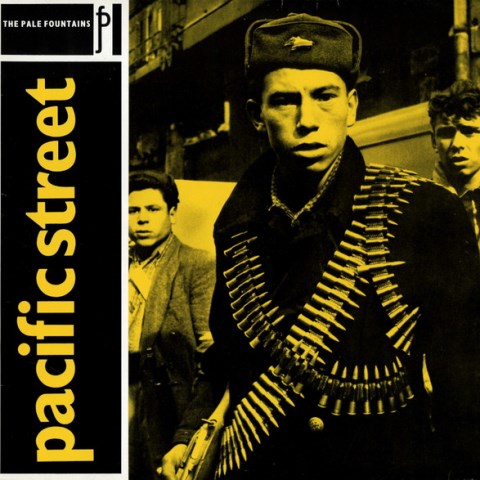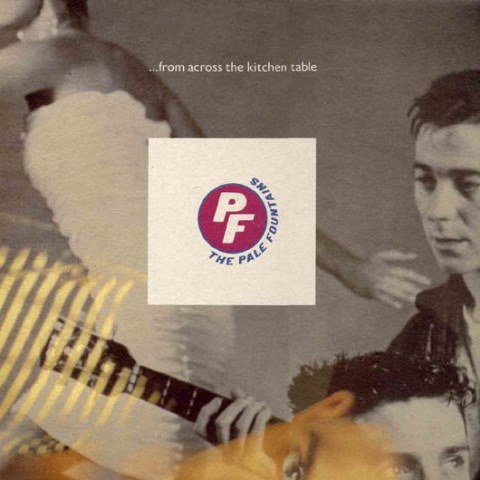Music Reissues Weekly: The Pale Fountains - The Complete Virgin Years | reviews, news & interviews
Music Reissues Weekly: The Pale Fountains - The Complete Virgin Years
Music Reissues Weekly: The Pale Fountains - The Complete Virgin Years
Liverpool-born, auteur-driven Eighties pop which still sounds fresh

The Pale Fountains played their first live show on 12 February 1980 as the support to on-the-up fellow Liverpudlians Wah! Heat. Their final stage appearance – notwithstanding the odd reunion – was on 21 May 1987 at their home city’s The Majestic Club, a venue which also traded as Mr Pickwick’s
In between, The Pale Fountains’ live schedule was erratic. Nothing was undertaken which constituted a full UK tour. Beyond one-offs or odd consecutive shows, there were a handful of December 1985 dates supporting Echo & The Bunnymen, three Japanese shows in May that year, a sprinkling of UK appearances over August and September 1982. Overall, for the span of the band, it was just 38 known shows.
 It’s a curious set of statistics for a band which issued seven singles and two albums, mostly on the high-profile label Virgin. In terms of ubiquity in record shops, as opposed to on stage, the peak years were 1984, when debut album Pacific Street was issued that February, and 1985, when second and final album …From Across The Kitchen Table came out (also in February). It’s also curious in the light of what followed: the band’s focal point and songwriter Michael Head formed Shack with his brother John (who had joined The Pale Fountains in late 1984). They played their first show in December 1987 and went on to appear on stage regularly. The Pale Fountains had not really bedded themselves in.
It’s a curious set of statistics for a band which issued seven singles and two albums, mostly on the high-profile label Virgin. In terms of ubiquity in record shops, as opposed to on stage, the peak years were 1984, when debut album Pacific Street was issued that February, and 1985, when second and final album …From Across The Kitchen Table came out (also in February). It’s also curious in the light of what followed: the band’s focal point and songwriter Michael Head formed Shack with his brother John (who had joined The Pale Fountains in late 1984). They played their first show in December 1987 and went on to appear on stage regularly. The Pale Fountains had not really bedded themselves in.
They formed after Michael Head encountered The Teardrop Explodes’ keyboard player Dave Balfe in Liverpool’s Probe Records shop. In turn, Balfe introduced him to local scenester David Palmer aka Yorkie, who later played bass with Space. Palmer exposed Michael to The Byrds and Arthur Lee’s Love. Burt Bacharach, Astrud Gilberto, Sergio Mendes and jazz soon followed. It all fed into how Michael envisaged The Pale Fountains and, of course, coloured his songwriting. Tellingly, The Pale Fountains, after a brief spell as The Dance Party were known for even less time as The Love Fountains. Michael has maintained he did not hear The Beatles until 1987 and has never listened to their “White” album.
Initially, the band was Michael Head (guitar, vocals), Andy Diagram (trumpet), Chris McCaffery (bass guitar) and Thomas Whelan (drums). After Diagram left in 1984, John Head joined.
 A chance to appreciate The Pale Fountains and their very particular approach to pop comes with the four-CD clamshell box set The Complete Virgin Years. Both albums are here, along with non-album remixes from B-sides and 12-inchers. Their pre-Virgin single does not appear, and surely could have been licensed to make this a complete Pale Fountains set. There is, though, a raft of alternate and rough mixes plus demos which were not issued back then. After they came out, each of the albums stalled in the lower reaches of the Top 100. The only single to chart, helped by a picture-disc edition, was the Virgin debut “Thank You.” In late 1982 it went no higher than a 48 chart position. It took more than a year after this for the first album to be issued. Momentum was lacking. Virgin dropped the band in 1986.
A chance to appreciate The Pale Fountains and their very particular approach to pop comes with the four-CD clamshell box set The Complete Virgin Years. Both albums are here, along with non-album remixes from B-sides and 12-inchers. Their pre-Virgin single does not appear, and surely could have been licensed to make this a complete Pale Fountains set. There is, though, a raft of alternate and rough mixes plus demos which were not issued back then. After they came out, each of the albums stalled in the lower reaches of the Top 100. The only single to chart, helped by a picture-disc edition, was the Virgin debut “Thank You.” In late 1982 it went no higher than a 48 chart position. It took more than a year after this for the first album to be issued. Momentum was lacking. Virgin dropped the band in 1986.
Heard now, Pacific Street and ...Kitchen Table – the focus, respectively, of Discs One (which, oddly, has a few differences between its tracklisting and what is heard) and Three – sound extraordinarily strong. Timeless too. As far as contemporaneous comparisons go: perhaps in the Aztec Camera ball park. But certainly not – despite a similar approach to clothes – Haircut 100. There are elements of bossa nova, a Burt Bacharach-informed classicism and, of course, shades of Love circa Forever Changes. All of which blends with a very direct pop sensibility. Tunefulness is paramount, as is ensuring that the arrangements are interesting, unpredictable. Evolved stuff. …From Across The Kitchen Table is slightly hampered by Ian Broudie's bright, direct production and its radio-friendly foregrounding of drums, whereas the band-produced Pacific Street is more dynamic, warmer. Pacific Street is the more satisfying of the pair, as it comes across as the more subtle album.
 Disc Two of the set collects what are identified as "Rough Mixes." However, the frequent presence of a drum machine suggests much of this material may be demos. There is no annotation indicating when (or where, or why) these were recorded, but as there are takes of “Beyond Fridays Field” and “(There's Always) Something on my Mind,” both of which are on Pacific Street, these assumedly are drawn from sessions prior to the recording of the album. If this is the case, in contrast to the shortage of live shows, The Pale Fountains had songs to burn – there is enough unreleased material here to form the basis of another album.
Disc Two of the set collects what are identified as "Rough Mixes." However, the frequent presence of a drum machine suggests much of this material may be demos. There is no annotation indicating when (or where, or why) these were recorded, but as there are takes of “Beyond Fridays Field” and “(There's Always) Something on my Mind,” both of which are on Pacific Street, these assumedly are drawn from sessions prior to the recording of the album. If this is the case, in contrast to the shortage of live shows, The Pale Fountains had songs to burn – there is enough unreleased material here to form the basis of another album.
Disc Four teams pretty uninteresting extended versions and remixes from singles with nine fascinating tracks annotated as demos: full-band recordings which, as they include versions of …Kitchen Table’s “27 Ways to Get Back Home” (preferable to the issued version), “Bruised Arcade,” “Shelter” and “These are the Things" must be try-outs recorded before commencing the sessions for the band’s second album (again, nothing indicates exactly what these are: didn't the tape boxes say something?). These are a window into how …From The Kitchen Table might have sounded if it had not received Ian Broudie’s production.
Frustratingly, although the band’s story is told, the essay in the booklet coming with this set has nothing to say about the material which was not issued at the time. This is very disappointing as the alternate The Pale Fountains which is presented is the major selling point of The Complete Virgin Years. Nonetheless, anyone with at least a passing interest in British, auteur-driven Eighties pop, as well as The Pale Fountains, Shack and Michael Head, needs this intriguing, tantalising release.
- Next week: Chip Shop Pop – Saint Etienne's Bob Stanley digs into British studio pop from the early Seventies
- More reissue reviews on theartsdesk
- Kieron Tyler’s website
Share this article
The future of Arts Journalism
You can stop theartsdesk.com closing!
We urgently need financing to survive. Our fundraising drive has thus far raised £49,000 but we need to reach £100,000 or we will be forced to close. Please contribute here: https://gofund.me/c3f6033d
And if you can forward this information to anyone who might assist, we’d be grateful.

Subscribe to theartsdesk.com
Thank you for continuing to read our work on theartsdesk.com. For unlimited access to every article in its entirety, including our archive of more than 15,000 pieces, we're asking for £5 per month or £40 per year. We feel it's a very good deal, and hope you do too.
To take a subscription now simply click here.
And if you're looking for that extra gift for a friend or family member, why not treat them to a theartsdesk.com gift subscription?
more New music
 Album: Mulatu Astatke - Mulatu Plays Mulatu
An album full of life, coinciding with a 'farewell tour'
Album: Mulatu Astatke - Mulatu Plays Mulatu
An album full of life, coinciding with a 'farewell tour'
 Music Reissues Weekly: Sly and the Family Stone - The First Family: Live At Winchester Cathedral 1967
Must-have, first-ever release of the earliest document of the legendary soul outfit
Music Reissues Weekly: Sly and the Family Stone - The First Family: Live At Winchester Cathedral 1967
Must-have, first-ever release of the earliest document of the legendary soul outfit
 Album: Robert Plant - Saving Grace
Mellow delight from former Zep lead
Album: Robert Plant - Saving Grace
Mellow delight from former Zep lead
 Brìghde Chaimbeul, Round Chapel review - enchantment in East London
Inscrutable purveyor of experimental Celtic music summons creepiness and intensity
Brìghde Chaimbeul, Round Chapel review - enchantment in East London
Inscrutable purveyor of experimental Celtic music summons creepiness and intensity
 Album: NewDad - Altar
The hard-gigging trio yearns for old Ireland – and blasts music biz exploitation
Album: NewDad - Altar
The hard-gigging trio yearns for old Ireland – and blasts music biz exploitation
 First Person: Musician ALA.NI on how thoughts of empire and reparation influenced a song
She usually sings about affairs of the heart - 'TIEF' is different, explains the star
First Person: Musician ALA.NI on how thoughts of empire and reparation influenced a song
She usually sings about affairs of the heart - 'TIEF' is different, explains the star
 Album: The Divine Comedy - Rainy Sunday Afternoon
Neil Hannon takes stock, and the result will certainly keep his existing crowd happy
Album: The Divine Comedy - Rainy Sunday Afternoon
Neil Hannon takes stock, and the result will certainly keep his existing crowd happy
 Music Reissues Weekly: Robyn - Robyn 20th-Anniversary Edition
Landmark Swedish pop album hits shops one more time
Music Reissues Weekly: Robyn - Robyn 20th-Anniversary Edition
Landmark Swedish pop album hits shops one more time
 Album: Twenty One Pilots - Breach
Ohio mainstream superstar duo wrap up their 10 year narrative
Album: Twenty One Pilots - Breach
Ohio mainstream superstar duo wrap up their 10 year narrative
 Album: Ed Sheeran - Play
A mound of ear displeasure to add to the global superstar's already gigantic stockpile
Album: Ed Sheeran - Play
A mound of ear displeasure to add to the global superstar's already gigantic stockpile
 Album: Motion City Soundtrack - The Same Old Wasted Wonderful World
A solid return for the emo veterans
Album: Motion City Soundtrack - The Same Old Wasted Wonderful World
A solid return for the emo veterans
 Album: Baxter Dury - Allbarone
The don diversifies into disco
Album: Baxter Dury - Allbarone
The don diversifies into disco

Add comment